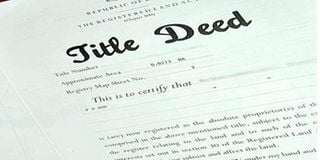Court: NLC has no powers to revoke title deeds even if obtained irregularly

The County Government of Kajiado has been stopped from issuing title deeds to landowners in dozens of towns in the devolved unit.
The Environment and Land Court has ruled that the National Lands Commission (NLC) does not have the authority to revoke title deeds, particularly on land that has never been public or government land.
Judge Addraya Dena, sitting in Kwale, ruled that there is no provision allowing the commission to revoke titles even if it is proven that they were obtained illegally or irregularly.
“The power to revoke title is vested in the Registrar and not the commission, which can only recommend,” said the judge who also stated that the commission has jurisdiction to review all land grants or dispositions, but only for public land or land that was previously public but was later converted to private land.
The Judge did, however, observe that the provisions of Article 67 (2) of the Constitution supersede the provisions of Section 14 (4) of the NLC Act, which gives the commission the authority to make a determination after hearing land-related disputes.
The article empowers the commission to conduct investigations into current or historical land injustices, either on its own initiative or in response to a complaint, and to recommend appropriate redress.
Justice Dena issued the decision in a case in which six Kwale residents had petitioned her court for several orders, including one declaring them as the legally registered owners of the property and another adopting the NLC determination issued in 2017.
The NLC determination revoked all titles held by Mr Ebrahim Ali Awale and Dhanjal Properties, returning ownership to the six complainants.
Mr Daima Nassoro, Mr Yusuf Ali, Mr Abdalla Mwakutula, Mr Salimu Mpwata, Mr Omari Mohamed and Mr Mohamed Athumani had asked for orders directing the Chief Land Registrar to issue them a title deed for the 2.4 Hectares of land in their suit filed in 2018.
They argued that the property was registered in their names in 1974 after they paid the requisite charges.
“The said entry was, however, crossed out by pen but no explanation for the same was made on the register. The property was then registered in the names of Mr Awale and Dhanjal Properties Limited without our knowledge and authority,” they said.
According to court records, the plaintiffs then filed a complaint with the NLC, and after hearing the case, the commission ruled in their favour on October 30, 2017.
The commission then ordered that all of Mr Awale's and Dhanjal Properties Limited's titles be revoked and the suit property be returned to the six plaintiffs.
In the suit before Environment and Land Court, the six plaintiffs accused the Chief Land Registrar of failing to comply with the NLC orders.
They then urged the court to consider the NLC recommendation and grant them the right to the suit property.
The commission did not respond to the suit. The Chief Land Registrar objected to the suit, arguing that because it did not participate in the NLC proceedings, it should not have been joined.
The Judge stated in her decision that even though the case was not defended, the six complainants were required to prove that they had a valid claim to the suit property.
The court did note, however, that the only documentary proof presented before it was the NLC determination, which was not supported by any other evidence, such as the history of the property since the time of adjudication, the adjudication search, and the green card allegedly proving their registration.
“In my view, it behoved this court to review the documentation and test their veracity against the oral testimony and make its own determination. It was incumbent upon the complainants to produce the documentary proof which they did not. I am unable to declare them as the legal and beneficial owners of the property,” said the judge.
The court also stated that there was no evidence mentioned in the NLC award to show that the land was ever converted to public land.
The Judge also observed that the property was private and not public, and that the commission made a determination rather than a recommendation, and directed the Chief Land Registrar to issue the 2.4 Hectares to the complainants.
“I refuse to sanitise the determination by adopting it in the present suit as invited by the plaintiffs, it was given without jurisdiction and outside the law,” said the judge.
The court concluded that the complainants had failed to prove their case on a balance of probabilities and were therefore not entitled to the orders sought.
“The Constitution is the Supreme Law of the Land. To the extent that NLC rendered a determination as opposed to a recommendation, I find that the decision is tainted with illegality,” said the Judge.




